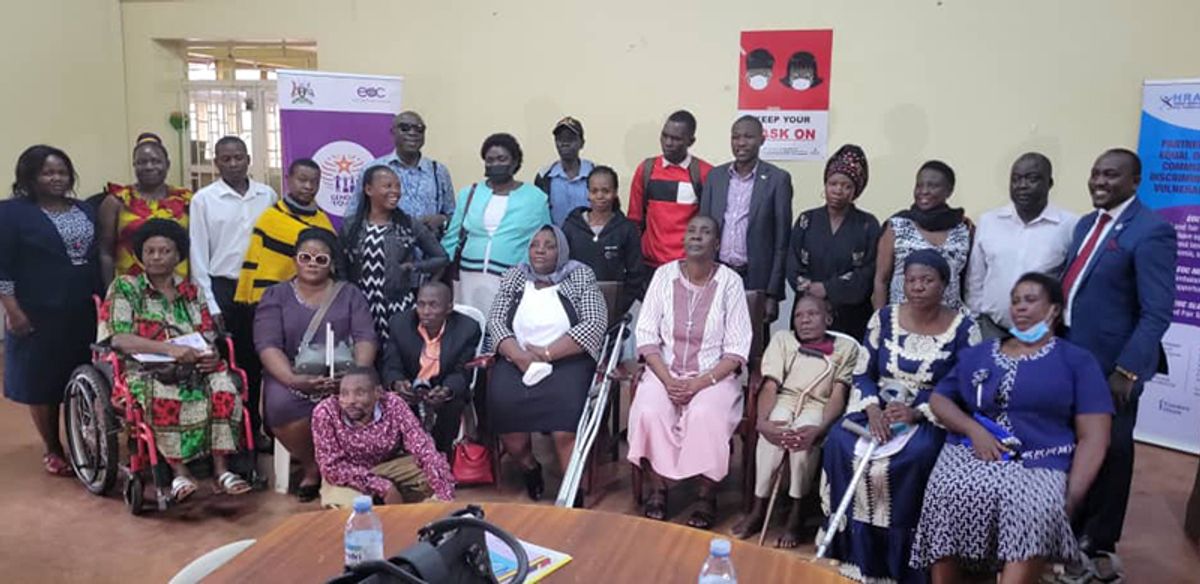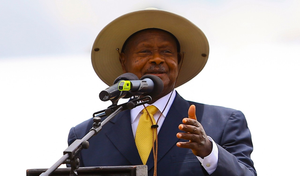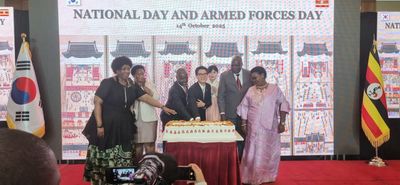

EOC Chairperson Ms. Safia Nalule (seated in-front with veil) sensitised the vulnerable persons’ leaders in Kampala on integrating equal opportunities in the Parish Development Model Implementation
The Uganda National Equal Opportunities Commission [EOC] has gone a step further in campaigning and promoting the recently introduced Parish Development Model [PDM] Program by publishing a special booklet that highlights the objectives and guidelines of the program.
The 57 page magazine titled “The guide to Integrating Equal Opportunities affirmative action, gender and Equity in the implementation of Parish Development Model [PDM]” is one of the reference documents to be used in the implementation of the program.
The magazine was released during the training of councilors and members of the Kampala Capital City Authority Older Persons Committees drawn from the five City divisions at Nakawa Community Hall recently.
Also in attendance were Executives of the KCCA People with Disability Council.
In her opening remarks, the Chairperson Equal Opportunities Commission, Safia Nalule Jjuuko called upon Leaders of the older Persons Committees right from the village up to the district levels to fully internalize the Parish Development Model Program and Popularize it among their people so that no elder is left behind.
She appealed to them, to organize meetings and seminars at Parish and sub county levels for the Elders and People with disability so that they also understand the program and activity participate in its implementation. She advised the leaders that when they organize such seminars they should invite experts and relevant leaders to explain the program and also answer questions from the elder participants.
Safia Nalue expressed her gratitude to President Yoweri Museveni for introducing the Parish Development Model as the latest service delivery strategy saying this is a vehicle for accelerating wealth and job creation on top of linking Government to the people at grassroot levels across the country.
Nalule said as a National Equal Opportunities Commission, their main role is to ensure that all marginalized and vulnerable groups are involved in the entire process of design, planning, budgeting, implementing, evaluation, accountability and reporting on the Parish Development Model.
We also have a responsibility of ensuring that the Parish Development Model Committees and actors keep an up to date register of all the marginalized groups within the Parish and villages.
We also try to provide guidance to development actors on how to effectively involve the marginalized and vulnerable people in the entire process.
According to the booklet published by the commission, The Parish Development Model is based on seven pillars namely production, storage, processing and marketing as the first pillar. Pillar number two features infrastructure and economic services, pillar three focuses on financial inclusion, pillar four deals with social services, pillar five concentrates on mindset change and cross cutting issues.
Pillar six deals with Parish Management Information System while the seventh and last pillar focuses on Governance and administration related issues.
The booklet explains each of the seven pillars in details. For example Pillar six which is about Parish Management Information System aims at generating house hold data and maintaining an up to date village and Parish Information file.
Nalule emphasized that one of their main roles now is to ensure that during the formation of groups, the elderly and special interest people are not left behind.
Such people must also be included on committees as special interest groups. Officers conducting elections and meetings must ensure that slots for the youths women, PWD’s and the Elderly are reserved. Anybody chairing a Parish Development Model meeting must ensure that the venerable are in attendance and provided with space to actively participate in the deliberations.
The venue should have all the necessary facilities to take care of the mobility needs of people with disability and the elderly.
While offering services that require lining up special considerations be given to PWD’s, the Elderly, expectant mothers and the sick so that they are not left behind or inconvenienced in any way.
Nalule expressed confidence that if all relevant officers and technical staff played their role, the Parish Development Model Program will elevate Uganda to a middle income level status. Speaking at the same ceremony, KCCA Older Persons Committee Chairman Leonard Anthony Lubowa thanks the Equal Opportunities Commission for publishing a booklet that gives detailed information and guidelines focusing on the Parish Development Model Program will go a long way in creating awareness among the beneficiaries.
The Author Mr. Henry Baguma is a Journalist and Secretary for Publicity, KCCA [KCCA] Older Persons Committee.














Henry Baguma
Leave a Comment
Your email address will not be published.